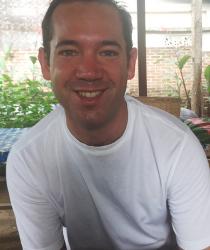
Try to conjure up an image of a typical 20th century army officer and the chances are that you’ll come up with a disciplined and somewhat conformist character with a natural disposition for following the rules. “My father was nothing like that,” reflects Andy Steed as he looks back on the path that he took to Bedales. “His job took him overseas a lot, which meant that my sister and I had to start at boarding school when I was eight. That was St. Bede’s in Eastbourne, which was a very traditional sort of prep school, where I wasn’t particularly happy. It just wasn’t the place for me. Back then, my parents were in the US and I joined them there halfway through what was supposed to be my final year at St. Bede’s. Mum, who was a teacher, home-schooled me for the rest of that academic year, which had its ups and downs but introduced me to a country that opened my eyes to a lot of things that I’d never even thought about before.”
It was here that Andy’s father underlined his open-minded way of thinking by paving the way for his son to move to Bedales in time for the start of the 94/95 school year. “The place was very much to his taste, my sister had already started there and so it was a natural progression for me to join here,” Andy recalls. “None of the other schools that we looked at together appealed to my parents anything like as much as Bedales and they certainly didn’t to me. Bedales always struck me as a place which was more relaxed and where I would be able to work out my own way through life.”
Sure enough, Andy found Bedales very much to his taste from the beginning of his time there. “It was a totally different experience for me,” he agrees. “Because the integration between students was so good, friendships seemed to be easy to make, which was wonderful for the quiet sort of character that I definitely was in those days. Looking back, I would almost say that Bedales was responsible for developing my personality.”
For Andy, it was the great outdoors that became his abiding passion at Bedales. “The school obviously has a tremendous reputation for its excellence in the arts but that wasn’t really my thing,” he admits. “I was outside as much as I possibly could be and having been brought up to try as many things as possible, that’s what I did. The outdoor work was an eye-opener – where else would you get the chance to learn as many new skills? – and then there was the sport, which really worked for me. I’d done a fair bit of it at St. Bede’s, but at Bedales, I played more or less everything, including basketball, even though I’m not the tallest person you’ll ever meet!”
None of the other schools that we looked at together appealed to my parents anything like as much as Bedales and they certainly didn’t to me. Bedales always struck me as a place which was more relaxed and where I would be able to work out my own way through life
Among the significant Bedalian influences on Andy’s life were two teachers with a strong connection to sport – Chris Howarth and John Scullion. “I knew John from the football field before I ever came into contact with him in the classroom,” Andy explains. “I had initially chosen Maths, Geography and Science A Levels, which, it soon became clear, weren’t all right for me and it was John who was instrumental in getting me to do economics instead. Bedales was brilliant at showing me that it was never too late to change your mind about something fundamental if there was a better choice to be made.”
Finally settling on Maths, Design & Technology and Economics A Levels, Andy also came under the spell of the renowned Mo Halli in the Bedales workshop. “I’d done a bit of woodwork before and always enjoyed doing stuff with my hands,” he says. “As everyone will tell you, Mo was amazing at what he did – just great at understanding what you needed and getting students through the course.”
Andy’s ideas about what his future career might involve were still not fully formed on the day that he left Bedales. “I wasn’t sure at all,” he acknowledges. “I had an idea that it would be something to do with the commercial world, maybe business development, marketing or something like that, so I went to Cheltenham & Gloucester University (now the University of Gloucestershire) to study international business and marketing. It was a mistake and I quickly saw that – I had to learn a language, for example, and I was always hopeless at languages. It was time for me to change course again.”
Now determined to follow a sports-related career, Andy settled on the idea of physiotherapy. “Because I didn’t have A Levels in the sciences, I had to start by taking a degree in Sports and Exercise Science, which I did at Roehampton University, before I could think about a proper physiotherapy qualification,” he explains. “For a year or two after Roehampton, I lived with some old Bedalian mates of mine while I worked as an administrator at a university, just to get a bit of proper experience of the real world. At the same time, though, I kept my hand in as an assistant physio and eventually decided that having come this far, I needed to focus on physiotherapy as a career.”
Andy duly took his physiotherapy degree at St. George’s in London before getting a prized first foot on the career ladder by landing a job at Hillingdon Hospital. “Physiotherapy was getting massively competitive around that time,” he says. “A lot of people, almost too many of them, were being trained up as physios and it was a topsy-turvy time if you were looking for work in the sector. The year above me at St. George’s found it incredibly difficult to find physiotherapy jobs and a lot of them ended up doing other things with their lives, so I was really lucky to cut my professional teeth in the NHS. It was a great grounding in every area of physiotherapy, including one or two that I didn’t even know existed, such as respiratory physio.”
By 2011, Andy was sufficiently experienced to be looking to progress in his chosen profession. “Nothing was available in the NHS at the time and I knew that private practice was a pretty tough market for physios as well but as it happened, I saw an ad for a role at BMI Healthcare and decided to apply for it even though it called for experience well beyond what I had then,” he remembers. “BMI told me that at interview as well but they also said that there was another temporary role available that might interest me.” That role, as a senior musculoskeletal and sports physiotherapist, would ultimately become a permanent position and was the ignition key that allowed Andy’s career to take off. It was, as Andy readily admits, a lesson in the power of persistence. “At Bedales, you learn to take risks, to be prepared not to succeed at first but never to give up,” he says. “The key is to see the opportunities when they do crop up and make sure that you grab them.”
So well did Andy seize his chance at BMI that within two years, he had become Physiotherapy Clinical Lead. Meanwhile he was also keeping an eye on the jobs market in the sporting world, where one vacant post particularly caught his attention. “There was an ad for a full-time physio with Arsenal Ladies FC, which immediately appealed to me because I’m a huge Arsenal fan,” Andy says. “By the time I’d finished um-ing and ah-ing about whether to apply for it, the position had been filled but not long afterwards, a couple of the Arsenal Ladies squad actually dropped round to BMI for some physio and something made me want to have another look to see if there might be anything for me at the club.”
As everyone will tell you, Mo [Halli] was amazing at what he did – just great at understanding what you needed and getting students through the course
There was indeed. A part time consultancy physiotherapist role was now on offer, providing an ideal counterpoint to Andy’s work at BMI at a time when women’s football was exploding into public consciousness. “The women’s game was taking off and becoming more professional and so was the sports medicine side of it,” Andy observes. “Originally, it had been a case of simply managing injuries, strapping up the players and making sure they were fit to play. As the money flooded into women’s football, everything became much more scientific and now we’re tapping into the resources of the men’s team as well. We’ve still some way to go before the resources in the women’s game are equal to those of the men, but we’re getting so much closer to that point.”
Andy’s work has taken him beyond even the hallowed portals of the Emirates Stadium. During 2016 and 2017, he and his wife Aideen, who is also a physiotherapist, were in Myanmar to work on a voluntary basis, teaching physiotherapy and helping to establish acute stroke and musculoskeletal services in the capital, Yangon. “Aideen had worked with this medical rehab consultant who is from Myanmar, which is how the whole idea began,” says Andy. “It took a while but eventually the authorities over there agreed to allow a multi-disciplinary team of people to come and help in a country where, although the medical knowledge was surprisingly deep and good, the occupation, speech and language facilities for recovering stroke victims were practically non-existent. As much as anything, our job was to get different people within the medical process working together for the greater good of their patients. It was such a beautiful and friendly place, Myanmar, for all its problems and an unbelievable experience for us to see it and work there.”
It was a partial answer to an ambition that Andy had always nursed to work overseas. “Physiotherapy travels pretty well so yes, I’d always thought that working abroad would be something that I’d do at some point,” he says. “The problem now is that I’ve started to put down serious roots over here – I’m married, obviously, and we now have a six-month old daughter – so I’m not quite sure when we would do it and how long we would go for. Meanwhile, I’d like to keep progressing and learning where I am right now and in an ideal world, continuing to develop my own caseload.”
Reflecting on the Bedalian that he used to be and still is at heart, Andy is convinced that his teenage self would have been favourably impressed by his adult successor two decades later. “I think he’d have imagined that I was going to become a banker and thought that I’d done a much more Bedalian thing instead,” Andy laughs. “He’d definitely have though that I’ve achieved a lifetime goal by working at Arsenal Football Club! Bedales has never left me and I don’t think it ever will; we were a close-knit bunch of friends as students and we still are now that we’re starting our own families.”
Andy was interviewed by James Fairweather in June 2019.
